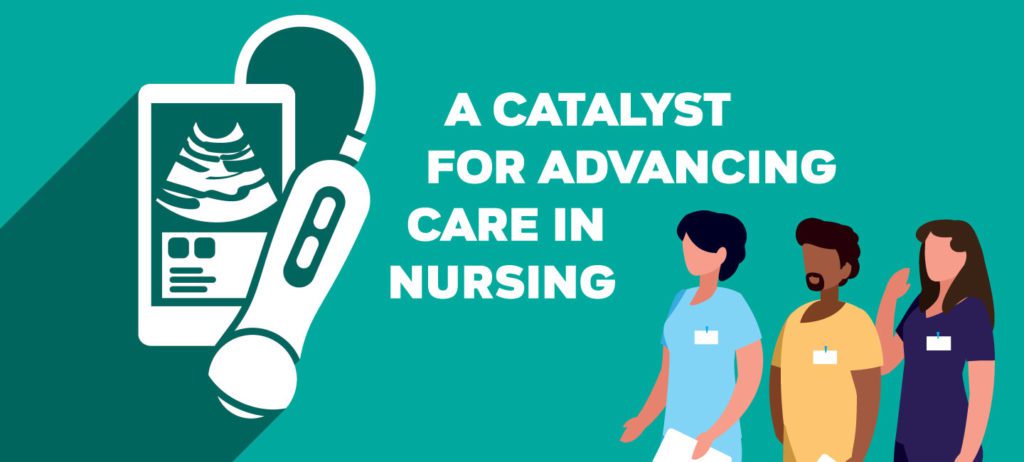Point-of-care ultrasound (POCUS) may be small in size, but its impact is monumental.
Its versatility has impacted multiple disciplines within the medical field. It has proven to be a tool that both medical professionals and patients benefit from and hold in high regard. Given the growth in its demand, more medical professionals have incorporated it into their practice, and more patients associate it with a higher level of care.

One specialty, in particular, has seen the popularity of utilizing ultrasound skyrocket in recent years.
Nurses, respected for the medical and emotional care they provide, have increasingly started using POCUS in their work, and its influence is certainly evident.
Nurses History of Care
A specialized medical discipline that dates back to 1854, nursing has continually grown and expanded as medical and technological advancements have occurred. Since its founding, American nursing has shaped society and paved a path for better health throughout history. Every community benefits from the care provided by these professionals.
As one of the largest specialties in the healthcare profession, nursing is divided into multiple roles such as:
- Registered Nurses (RNs)
- Certified Registered Nurse Anesthetists (CRNAs)
- Nurse Practitioners (NP)
Nursing is undeniably a medical specialty that touches patients at all points along their health journey.
In a 2019 Fact Sheet, The American Association of Colleges of Nursing highlighted how nursing “roles range from direct patient care and case management to establishing nursing practice standards, developing quality assurance procedures, and directing complex nursing care systems.”
Consequently, nurses have historically and still do fill many shoes while providing outstanding medical care and uplifting emotional support that drastically impacts their patients’ experiences.
Nurses have dedicated themselves to learning and growing, continuing to bring waves of care among their patient population.
Nurses with POCUS Reach New Levels of Care
Across the profession, nurses are continually uncovering ways that POCUS can enhance the care they provide.
Leon Chen, a Clinical Assistant Professor at New York University Rory Meyers College of Nursing and a board-certified adult-gerontology acute care nurse practitioner with a background in emergency and critical care medicine, was featured in a recent FOCUS on POCUS™ podcast episode . Chen is a strong advocate for POCUS and is an active user of the modality.
Chen was inspired to learn POCUS, leading to him falling in love with the “technology and the uses of it.”
This spark propelled him to learn more about POCUS, receive credentialing, and use this modality daily in his nurse practitioner practice. Additionally, during the episode, Chen highlighted numerous examples of how using POCUS in his practice had immediate and direct positive outcomes for patients.
His narrative and implementation of POCUS match that of the nursing profession as a whole.
In 2018, a study addressed how ultrasound training for nurses provided benefits for patients and clinicians alike. Another example was showcased in a 2019 Letter to the Editor titled UltraNurse: teaching point-of-care ultrasound to intensive care nurses, which drew in research to support the assertion that “teaching POCUS to intensive care nurses” could benefit the management of patients at the bedside.
Different medical societies and associations are strongly encouraging nurses to incorporate it into their toolkit. The American Association of Nurse Anesthetists released practice considerations surrounding the use of POCUS after addressing how “Point-of-Care Ultrasound (POCUS) is emerging as a critical and core skill that Certified Registered Nurse Anesthetists (CRNAs) should possess.”
As nurses continue to adapt to emerging medical technologies like POCUS and build upon their expertise, we are sure to continue to see a rise in exceptional patient care. This adaption will lead us all on a trajectory of paving the way for a future of better care in medicine. Listen in to Chen’s journey with POCUS and discover how it is changing the medical course of patients.
Link to the episode here.
_____
Want to learn more about the impact POCUS is having on patient care? Visit our education and training resources page for more in-depth insights. Ready to begin your POCUS journey? Check out our many certificates and certifications here.





















